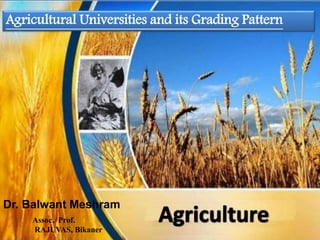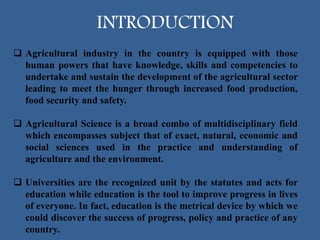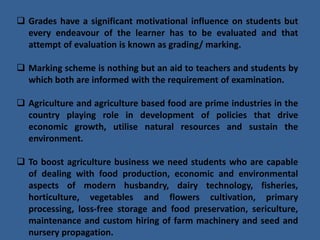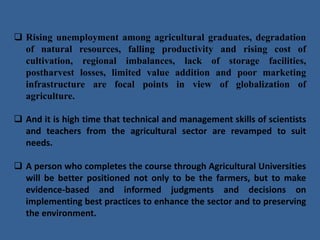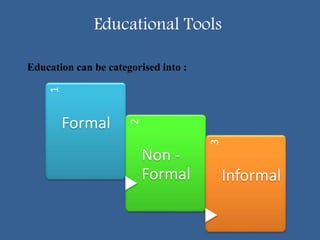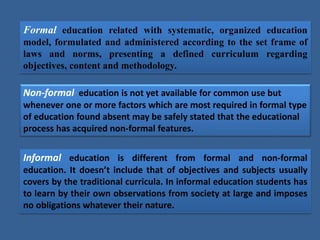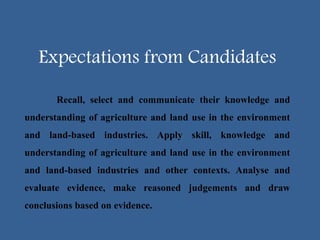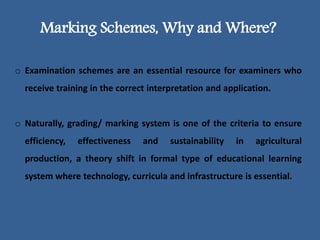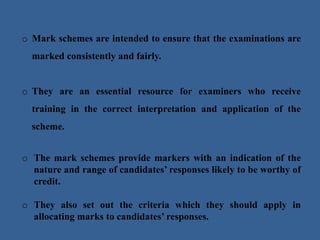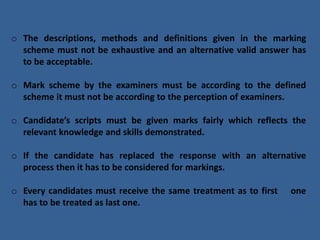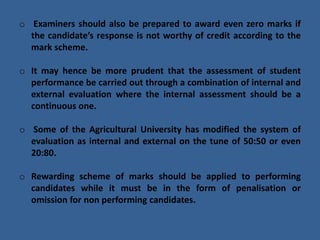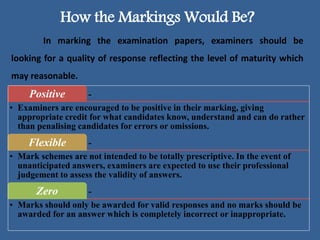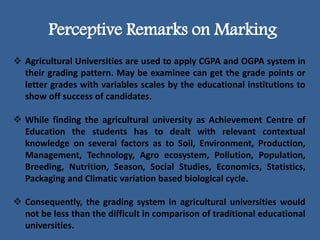Agriculture universities & Grading Pattern
- 1. Agricultural Universities and its Grading Pattern Dr. Balwant Meshram Assoc. Prof. RAJUVAS, Bikaner
- 2. INTRODUCTION ’ü▒ Agricultural industry in the country is equipped with those human powers that have knowledge, skills and competencies to undertake and sustain the development of the agricultural sector leading to meet the hunger through increased food production, food security and safety. ’ü▒ Agricultural Science is a broad combo of multidisciplinary field which encompasses subject that of exact, natural, economic and social sciences used in the practice and understanding of agriculture and the environment. ’ü▒ Universities are the recognized unit by the statutes and acts for education while education is the tool to improve progress in lives of everyone. In fact, education is the metrical device by which we could discover the success of progress, policy and practice of any country.
- 3. ’ü▒ Grades have a significant motivational influence on students but every endeavour of the learner has to be evaluated and that attempt of evaluation is known as grading/ marking. ’ü▒ Marking scheme is nothing but an aid to teachers and students by which both are informed with the requirement of examination. ’ü▒ Agriculture and agriculture based food are prime industries in the country playing role in development of policies that drive economic growth, utilise natural resources and sustain the environment. ’ü▒ To boost agriculture business we need students who are capable of dealing with food production, economic and environmental aspects of modern husbandry, dairy technology, fisheries, horticulture, vegetables and flowers cultivation, primary processing, loss-free storage and food preservation, sericulture, maintenance and custom hiring of farm machinery and seed and nursery propagation.
- 4. ’ü▒ Rising unemployment among agricultural graduates, degradation of natural resources, falling productivity and rising cost of cultivation, regional imbalances, lack of storage facilities, postharvest losses, limited value addition and poor marketing infrastructure are focal points in view of globalization of agriculture. ’ü▒ And it is high time that technical and management skills of scientists and teachers from the agricultural sector are revamped to suit needs. ’ü▒ A person who completes the course through Agricultural Universities will be better positioned not only to be the farmers, but to make evidence-based and informed judgments and decisions on implementing best practices to enhance the sector and to preserving the environment.
- 5. OBJECTIVES ’ā╝ Maintaining of consistency in standards of education. ’ā╝ Faculty or professional is the advisor to assist in career planning, implementing and completing academic programs. ’ā╝ Professionals and para-professionals who disseminate and help in application of knowledge, skill and technology to practising students. ’ā╝ Student requiring clarification of outstanding degree requirements and to taste the success. ’ā╝ To transfer the scientific knowledge to the farmers (ground level), for better agricultural processing and production. ’ā╝ To generate or develop new rural, agriculture based small industry.
- 6. Educational Tools Education can be categorised into : 1 Formal 2 Non - Formal 3 Informal
- 7. Formal education related with systematic, organized education model, formulated and administered according to the set frame of laws and norms, presenting a defined curriculum regarding objectives, content and methodology. Non-formal education is not yet available for common use but whenever one or more factors which are most required in formal type of education found absent may be safely stated that the educational process has acquired non-formal features. Informal education is different from formal and non-formal education. It doesnŌĆÖt include that of objectives and subjects usually covers by the traditional curricula. In informal education students has to learn by their own observations from society at large and imposes no obligations whatever their nature.
- 8. Expectations from Candidates Recall, select and communicate their knowledge and understanding of agriculture and land use in the environment and land-based industries. Apply skill, knowledge and understanding of agriculture and land use in the environment and land-based industries and other contexts. Analyse and evaluate evidence, make reasoned judgements and draw conclusions based on evidence.
- 9. Marking Schemes, Why and Where? o Examination schemes are an essential resource for examiners who receive training in the correct interpretation and application. o Naturally, grading/ marking system is one of the criteria to ensure efficiency, effectiveness and sustainability in agricultural production, a theory shift in formal type of educational learning system where technology, curricula and infrastructure is essential.
- 10. o Mark schemes are intended to ensure that the examinations are marked consistently and fairly. o They are an essential resource for examiners who receive training in the correct interpretation and application of the scheme. o The mark schemes provide markers with an indication of the nature and range of candidatesŌĆÖ responses likely to be worthy of credit. o They also set out the criteria which they should apply in allocating marks to candidatesŌĆÖ responses.
- 11. o The descriptions, methods and definitions given in the marking scheme must not be exhaustive and an alternative valid answer has to be acceptable. o Mark scheme by the examiners must be according to the defined scheme it must not be according to the perception of examiners. o CandidateŌĆÖs scripts must be given marks fairly which reflects the relevant knowledge and skills demonstrated. o If the candidate has replaced the response with an alternative process then it has to be considered for markings. o Every candidates must receive the same treatment as to first one has to be treated as last one.
- 12. o Examiners should also be prepared to award even zero marks if the candidateŌĆÖs response is not worthy of credit according to the mark scheme. o It may hence be more prudent that the assessment of student performance be carried out through a combination of internal and external evaluation where the internal assessment should be a continuous one. o Some of the Agricultural University has modified the system of evaluation as internal and external on the tune of 50:50 or even 20:80. o Rewarding scheme of marks should be applied to performing candidates while it must be in the form of penalisation or omission for non performing candidates.
- 13. How the Markings Would Be? In marking the examination papers, examiners should be looking for a quality of response reflecting the level of maturity which may reasonable. -Positive ŌĆó Examiners are encouraged to be positive in their marking, giving appropriate credit for what candidates know, understand and can do rather than penalising candidates for errors or omissions. -Flexible ŌĆó Mark schemes are not intended to be totally prescriptive. In the event of unanticipated answers, examiners are expected to use their professional judgement to assess the validity of answers. -Zero ŌĆó Marks should only be awarded for valid responses and no marks should be awarded for an answer which is completely incorrect or inappropriate.
- 14. Perceptive Remarks on Marking ’üČ Agricultural Universities are used to apply CGPA and OGPA system in their grading pattern. May be examinee can get the grade points or letter grades with variables scales by the educational institutions to show off success of candidates. ’üČ While finding the agricultural university as Achievement Centre of Education the students has to dealt with relevant contextual knowledge on several factors as to Soil, Environment, Production, Management, Technology, Agro ecosystem, Pollution, Population, Breeding, Nutrition, Season, Social Studies, Economics, Statistics, Packaging and Climatic variation based biological cycle. ’üČ Consequently, the grading system in agricultural universities would not be less than the difficult in comparison of traditional educational universities.

